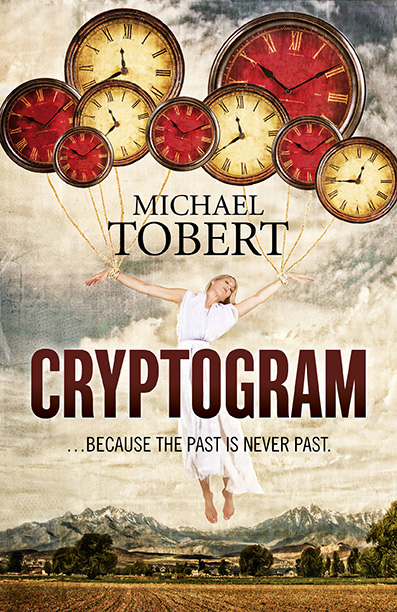Cryptogram
Welcome to the dystopian world of 2050: two men and a woman, lovers haunted by the echoes of a past 800 years before.

Welcome to the dystopian world of 2050: two men and a woman, lovers haunted by the echoes of a past 800 years before.
Welcome to the dystopian world of 2050: two men and a woman, lovers haunted by the echoes of a past 800 years before.
Afterlife & reincarnation, Historical, Literary
TWO MEN AND A WOMAN. 800 YEARS ... IT ISN’T OVER WHEN IT’S OVER.
It is 2050 in a cold town in northern Europe. The war has ended but the streets are dangerous. Three lovers, Stephen, Suzanna and Rokas, live under the shadow of the gun-king, Porphyrian, but are driven by their common history and unfinished business during an earlier age of darkness, the Cathar Inquisition of the 13th century.
And between the dystopian worlds of the 13th and 21st centuries? ... Other times and other places, stories and sideways glances. Because the past is never past. Lives loop. The direction of travel is circular. Do you believe in reincarnation? What do we bring with us when we arrive? What is progress? What is death?
Click on the circles below to see more reviews
‘After all, it is no more surprising to be born twice than once’, Voltaire. Cryptogram, Michael Tobert’s dystopian novel, explores the intertwined lives of three lovers – two men and a woman – across eight hundred years. The book begins with Suzanna, Stephen and Rokas playing a strange game, a stripped down version of pool, where the sides are wood and the rebounds unpredictable. The year is 2050, and conflict-ridden Northern Europe is in the grip of the shadowy gun-king, Porphyrian. As the characters move around the table, it seems their lives are richocheting off each other, like the balls in the game they are playing. Just as revelations about Suzanna’s tortuous past seem to bring the story within one’s grasp, the narrative shifts eight hundred years into the thirteenth century. Now we are among the Cathars, witnessing Suzanne’s interrogation at the hands of two inquisitors, one of whom, the gargantuan ‘R’, is given the seemingly impossible task of defending her. When Suzanne’s brother, Stefan, is caught fleeing through the Languedoc countryside, the shape of this remarkable novel starts to appear. For the rest of the book, the story shifts back and forth, occasionally dropping in on other centuries too. This is a cleverly constructed novel that tackles big ideas, central of which is an exploration of what it means to be conscious. Tobert appears to follow the famous dictum of the arch-rationalist Voltaire: ‘after all, it is no more surprising to be born twice than once. Everything in nature is resurrection.’ In this world of reincarnated possibility, how does one make the right choices? How do our resulting actions affect the lives of others? Does one really make choices, in any meaningful sense, at all? Are we condemned to make the same mistakes again and again, or can we create our lives anew? Amidst it all, the lives of the three lovers appear stitched together like pieces of a patchwork quilt. All three characters are developed with skill; Rokas, described as “a pantomime giant abandoned from above by a puppeteer with aching arms” is perhaps the most intriguing. It is around him that the other characters’ lives pivot, as they shift through the centuries. The denouement – set in a strange tribal wilderness – offers a glimmer of hope for the future. This is the third book from Michael Tobert, a long-time resident of St Andrews. His first two books were humorous; Cryptogram is literary and shows him to be a writer of great inventiveness, skill and creativity. It is a thought-provoking, exciting and beautifully written novel which deserves a wide audience. ~ Andrew Duff, Author of Sikkim; Requiem for a Himalayan Kingdom, Birlinn
I must declare an interest in the genesis of this book, having had a few conversations with Michael about the Cathars and reincarnation, which forms the background of this intriguing and very well written novel where ‘the past is never past.’ The scenes alternate between northern Europe in 2050 under the shadow of an arms dealer Porphyrian and 13th century Languedoc, where the Inquisition was set up in 1233. The three central characters, who are also lovers, are Stephen, Suzanna and Rokas, and their current situation and relationships are inextricably bound – even by birthmarks in Suzanna’s case - to their past lives 800 years before. This sets the scene for a complex interweaving of parallel lives, hidden motives and looping outcomes that refer backwards and forwards as the plot unfolds. In each era there are challenging moral dilemmas and decisions that affect the very lives of these characters. There is corruption within the Church, exemplified by a priest who takes advantage of young women, including Suzanna, but is burned at the stake, as she also is a little later on under the auspices of one of the other main characters. These are gruesome scenes, best not read late at night. The reader is drawn along by the vivid narratives and is able gradually to piece together the many connections between the two sets of lives, and the whole is enhanced by a series of short stories shedding further light on the dynamics of the plot. I don’t want to give away any more in a short review, but I found myself wholly immersed in the parallel stories and stimulated by the issues raised as well as enjoying the sheer quality of the writing. ~ David Lorimer, Scientific and Medical Network Editor, Network Review